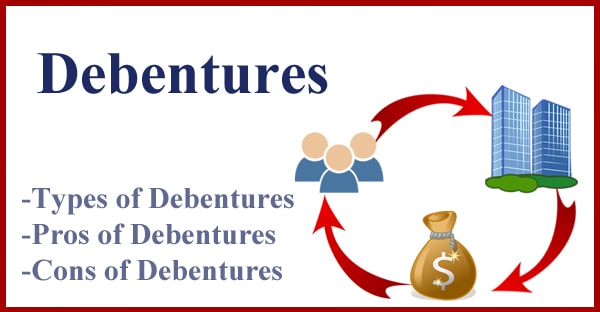Funding is very important when it comes to operate a business and provide the customer with the services they want. Debentures are a debt instrument that meets the company funding needs, most of the time the funding provided by the company shareholder is not enough to operate the company needs. This is where the Debentures come into play that provides the companies with the capital. Debentures are brought by the shareholder in the form of bonds for which they will be provided with the interest which is usually higher than the bank’s interest rate.
This makes the debenture a very prominent financial instrument to invest in. This, however, comes with some risks that are involved while investing in the bonds. In this article, we will discuss what are Debentures and the types of debentures, Pros and cons of the debenture.

What are Debentures?
Debentures are a lending agreement that is between a company and the shareholder. This provides the company with the capital needs and in return promises the investor with the return of the principal amount within the specific period of time along with the interest rate. In India, Bond and Debentures a confused with each other but there is a slight difference between them. Bonds are long term investment and debentures are short term investments.
Types of Debentures
Convertible & Non-Convertible Debentures
Convertible debentures are those debentures that can be converted into company equity or stocks easily but the Non-Convertible Debentures (NCD) is those debentures that cannot be converted. The risk associated with NCD is high as compared to that of the Coverable debenture.
Secured & Un-Secured Debentures
As the name suggests secured and unsecured are the nature of the debenture. Secured Debentures makes the company sell the property or any other asset to pay the secured debentures in the case of bankruptcy whereas there is no surety of any return in the unsecured. The payment will be done after the payment of the Secured Debentures.
Fixed & Floating Rate Debentures
Fixed and floating debentures are those debentures where the company asset that is used for selling in case of bankruptcy is fixed or is floating. For example- A manufacturing company main factory is signed off as an asset to the creditor until the loan is paid, this is called fixed debentures and when the full inventory is signed off which may vary is called floating debentures.
Tax on Debentures
Debentures are treated as the “Income from Other Sources” which makes them eligible to the income tax cut. The interest earned on the investment will be taxed and is computed by the following two ways-
Short Term Capital Gain
Short term Capital Gain is computed when the debenture is held less than the year and sold to others, the income earned will be taxed according to the income tax slab.
Long Term Capital Gain
Long term Capital Gain is computed when the debenture is held for one or more years. The income earned will be taxed according to the rate of 10% without indexation benefit.
Advantage of Debentures
- Debentures do not give right either to vote or take part in the management of the company
- The Debenture is tax deductible expenditure which can save income tax
- Cost of debenture is relatively lower than preference shares and equity shares
- Debentures are advantageous during times of inflation
- Debenture has very less risk when it comes to the investment
Disadvantage of Debentures
- Company has a borrowing capacity and with debentures the borrowing capacity reduces
- There is a burden on the company for the repayment of the debentures therefore, there is a risk when the earnings of the company fluctuate



